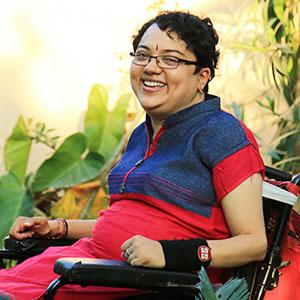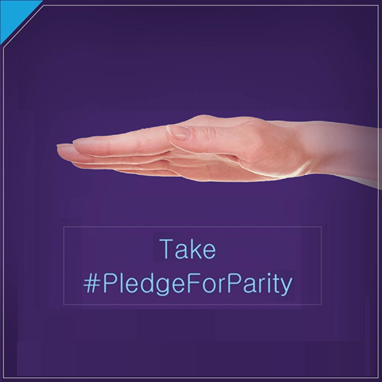
An effervescent 18-year-old, Preethi Srinivasan, a super achiever in every field. The world was at her feet and the stars in her eyes when overnight she turned into a quadriplegic. Preethi, today, is still reaching out to the world from her wheelchair and her organisation Soulfree is out to create great opportunities for those confined to the wheelchair.
A freewheeling talk with the bright, young lady who, incidentally, talks into a speech activated software, Dragon Naturally Speaking from Nuance Communications, which in turn types out her very articulate email.
Preethi, you have always been an achiever. Is it the same spirit which drives you even now, or has it undergone a change? If so, how?
This is a difficult question for me to answer because my core drive was never to be an achiever. I started swimming at the age of three because it was my father's dream. I played cricket because I enjoyed every moment of it. The so-called achievements were incidentals. I did things for love. My accident, of course, changed my life. After being incredibly fit and active throughout my life, to become paralysed below the neck at the age of 18 is not something one can digest. However, now, I feel that I'm a much better, much deeper human being than I used to be. Having known failure, loss, complete helplessness and dependence, I can be much more empathetic to the troubles of others. Also, my experience has taught me to be much more self-fulfilled, much more present in the here and now, because I know that success as it is popularly defined, the approval of society, are evanescent at best. I know who I am, and I don't need anything from the external world to keep me happy.
Would you say Soulfree is the only organisation of its kind? If so, why?
I would like to think that Soulfree is definitely providing a service that is essential for Indian society right now, and in a unique way. As it has been started by a woman, who is a quadriplegic and has gone through the helplessness of this condition, I know what persons with spinal cord injury and their families go through intimately. The statistics about spinal cord injury in the USA are that one happens every 38 mins. In a country like India that is 1 billion strong, there are no statistics at all about how many spinal cord injuries happen every year. The Indian government does not recognise spinal cord injury as a specific disability at all. Most successful NGOs are those that work in areas of high return on investment, and I know the work we are doing will require a great deal of commitment, perseverance and hard work, but that is precisely why I think there is so much need for it.
Soulfree's aim is that every youngster knows about the seriousness of this condition, so that they can take the required safety precautions. I feel that spreading awareness is essential.
The basic details that people need to know regarding spinal cord injury is that:
- A spinal cord injury can happen to anyone
- Spinal cord injury has no cure currently anywhere in the world
- In a country as big as India, there are no statistics on how many spinal cord injury occur in a year, no awareness amongst the general populace about what it is, no proper emergency medical care, no long term rehabilitation centres (not even one in the entire country), no wheelchair accessibility, no government support, no opportunities in education, employment and entrepreneurship, no medical insurance and to top it all strong stigma from family and society leading many, especially women, to commit suicide.
So, in order to fundamentally change the way for those with severe disabilities, especially those with spinal cord injury, Soulfree is working relentlessly to sensitise society.
Is Soulfree only geared towards women? If so, why?
Soulfree is not geared only towards women, but, since the stigma faced by women with severe disabilities in Indian society is so strong, we definitely give preference to women.
Those who sustain spinal cord injury need help from the moment of injury.They will need short-term rehabilitation care of them, they need long-term rehabilitation centres. There is not even ONE long-term rehabilitation centre or Independent Living Centre for a woman with spinal cord injury or any other multiple disability to live in permanently if her family cannot care for her. This is ridiculous because the country has 1 billion people, and nearly half are women. If even 2% were to get multiple disabilities, where will they go?
Soulfree's ultimate vision is to create an inclusive township, where people with severe disabilities can come and live permanently. They will be trained and supported so that they can be as active and productive as possible. For example, one of Soulfree's initiatives is called "Throat Fort" and its aim is to provide voice-based jobs for quadriplegics, who are paralysed below the neck and do not have use of their hands or legs. By training them and giving them the skills to become radio jockeys, voice over artists, TV presenters, and so on, and find employment for them in the recording of audio books, as telephone operators, BPO centre employees etc., we aim to ensure that quadriplegics can also lead a life of dignity and purpose. So, the dream is to take a group of people who have been stigmatised and discarded by society, and create an exemplary community that is inclusive and sustainable in every way.
The theme for this year’s International Women’s Day being Pledge for Parity, do you feel each of us can be a leader within our own spheres of influence and commit to take pragmatic action to accelerate gender parity? How would you want to take this forward?
Every individual has the capacity to be a leader. If we wish to change anything in our society, the only way to do it is to search within ourselves and fundamentally change our perspective, our intent, our prior conditioning, our bias. The greatest service a person can do for the world is to realise one's own true nature and understand that whatever we are seeing in the world outside is somehow a result of what is within us.
So, if you are a parent, who has a daughter and a son, you need to make every effort to treat them equally. At the same time, by parity I do not mean equality literally. I mean there must be a sense of equilibrium, balance, harmony in all our interactions. Women must not be seen as a possession, somehow inferior or weak. I think women themselves must take the responsibility to change this perspective for the next generation. It is very important for us to work consciously on erasing very deeply held beliefs that are conditioned into us through previous generations, that we transmit to the next generation.
We need to block out these conditioned ideas about what a woman can or cannot do, in order to break down traditional gender roles. I feel it is women who have this responsibility, because it is the mother who nurtures the child, both son and daughter with their fundamental concepts about self-image, gender roles in society – what is accepted and what is not. For men, I feel it is extremely important for them to treat the women in their life, mother, girlfriend, sister, wife with great deal of respect and sensitivity. Children learn not from our words, but from our example, and every time his father treats his mother in an abusive or disrespectful manner in front of the child, it will make an impact that is much deeper than words ever will.
What kind of changes do you think need to be implemented at the societal, governmental and the individual level to make India a better place for people with disablilities?
Individuals with Disabilities:
1. Need to stop feeling sorry for ourselves and go beyond "why me?", to "why not me?"
2. Need to get out into the real world and stop being locked up within our home, where they feel safe.
3. We must show the strength to act. We must go after our dreams, ambitions and desires and fight all the obstacles that come along the way. This is when we will realise that, when we really need help, people will come forward to help us. But, if we give in to our fears, and never try, we will always fail.
Individuals without Disabilities:
1. There is an essential need to look beyond "I, me, and mine" and see how we may help those who are really suffering in life.
2. Qualities like empathy, compassion and love are vital to break away from the mechanical lives we lead today. Somehow, we must destroy the armour of indifference and apathy we have created around ourselves and feel the pain of those around us.
3. Just sit in silence for 15 min and ask yourself, "who am I?", not the usual "what am I?" – Mother, father, professional etc.
4. Ask yourself why you do the things you do. How would your life be if you had everything you seek today? Look at Bill Gates. He has gained as much wealth as is possible, and has now retired to give it all away! Ask yourself why.
5. Help those in need. Volunteer for good causes. Take time to help those who suffer. Do whatever you can to reach out to those who are filled with fear, loss of self-esteem because of disability.
Society:
1. There is an absolute need for the sense of connectedness to seep deep into all of us. We are not alone. True upliftment can happen only when if all of us rise together.
2. People and organisations need to take their social responsibilities seriously and be held accountable for the problems in our society. We are our society. If there is a problem in our society, it is a problem within us. Each and every one of us needs to do our bit to fundamentally change the way our society functions.
Government:
Every citizen, whether disabled or not has the right to lead a life of dignity and purpose. The government needs to do everything it takes to ensure that those with severe disabilities have Basic Quality of Life, Financial Assistance, Medical Care, Medical Insurance, Equal Opportunities in Education and Employment, and Wheelchair Accessibility.







